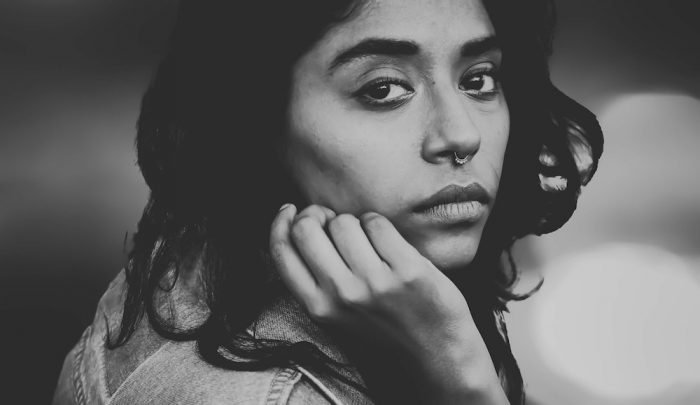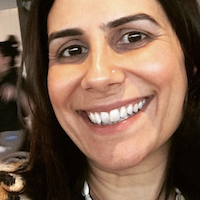If you had to describe yourself in just three words, would one of those words refer to the colour of your skin?
I’m not white, but I can definitely think of more defining characteristics than the shade of my complexion.
Depending on the season, I can get pretty brown. In summer, my husband says I turn a mahogany colour, but in the depths of winter it’s probably more like a light oak.
There’s a reason I tan easily: my father was Asian. My mother is Polish, but I take after my dad when it comes to colouring.
Despite my “exotic” background, I would always describe myself as British because I was born and brought up in London—so how could I consider myself anything else? I have a distinctive London accent, but nevertheless, when I was growing up and even into my mid to late 20s, whenever I met new people, I would routinely be asked, “So, where do you come from then?”
We used to go on family holidays to Poland when I was younger, and I would often get stared at. As an awkward, self-conscious teenager, I found this pretty excruciating.
My mum is originally from a small town, and the fact is people just weren’t used to seeing people like me. My father, brother, and myself were the only people of colour for miles around when we visited. But when we used to go to India, things weren’t always much better. Yes, my skin colour was more the norm, but I was still noticeably and obviously from elsewhere.
Ironically, whereas in Poland a “nice tan” might be admired (as long as you didn’t get too dark), in India, the paler the better. Having pale skin is associated with being from a higher caste, while in Poland or the United Kingdom, having a tan is seen as the sign of someone who can afford to go on nice holidays.
It’s been a while since anyone has asked me where I’m really from and even longer since I found myself on the receiving end of racist slurs. Fortunately, it’s not really socially acceptable to describe people as “Pakis” any more. Does that mean that I’m no longer subject to racism? The truth is covert racism can be even more insidious; the worst thing about it is that you can never even be really sure that it’s happening. You might be accused of being paranoid—or, worse still, “playing the race card.”
The Black Lives Matter movement has made us all think about race a lot more. I felt like I had put my experiences behind me. In fact, I can even just about laugh some of them off now. But then I’ve never had a police officer put his knee on my neck because of my colour.
I may not be part of the privileged white, but I had a pretty middle-class upbringing so I can’t pretend I’ve had it really tough. I haven’t. I haven’t been stopped and searched by police umpteen times. I don’t have ancestors who were kept as slaves—well, not to my knowledge. I do have ancestors who were colonised by the white British, though, and forced into subjugation.
The honest truth is that I don’t really think about my colour that much these days, and I recognise that in itself is a kind of privilege—although of course it shouldn’t be. People don’t tend to cross the street to avoid me because they are afraid I might mug them.
Occasionally, especially when I go outside London, I might find myself in situations where I’m the only non-white person, say in a country pub. It doesn’t really bother me much. This can even happen in multicultural London. In fact, sometimes I might be teaching a yoga class and realise I’m the only non-white person in the room—but maybe being at the front makes it easier, although for some I can imagine this would make it worse. If I do a yoga course to further my personal development, I might also discover I’m the only non-white person in the room.
Recent events have rightly forced many institutions and organisations to take a long, hard look at themselves. Any attempt to question and improve the status quo should be encouraged—but I have winced a bit at the attempts of some in the yoga world.
I recently saw a social media post about “yoga teachers of colour.” Maybe it’s just me, but I would like to be judged on my teaching, not my colour. I have hesitated to come out and say this publicly, because I recognise that this may well be an unpopular view in what is already an incredibly heated debate.
I totally understand why in a completely white-dominated industry, some might see the merit in compiling lists like this. In order to readdress the balance, we probably do need to go through a period when non-white teachers are actively promoted more. But I still stand by my previous statement.
My colour obviously has an influence on who I am as a person, but not on the quality of my teaching. I’m not completely defined by it. If someone someday decided to include me on a list of “up-and-coming yoga teachers to watch,” I’d be delighted—but I’d rather not be on it if it was just because as they were compiling their list they thought “Oh no! I haven’t got any coloured teachers on here!” Likewise, I would have mixed feelings about being included on a list of “up-and-coming yoga teachers of colour.” I would prefer to be included because of my teaching skills and experience.
To put this all in context, I benefited from “positive discrimination” in my former career as a newspaper journalist. I got my first opportunity as a journalist because in the late 90s, the Evening Standard had finally realised that the newsroom was almost exclusively white. Being a paper that was supposed to serve one of the most multicultural cities in the world, it was decided that something should be done about this.
Coincidentally, I just so happened to write to The Standard around the same time to inquire about any openings. Someone must have read my letter, spotted that I had an Asian sounding name, and declared, “That would bump up our multicultural credentials. Let’s get her in then!”
I actually didn’t realise this was why I had managed to secure an interview. I was on a prestigious post-graduate journalism diploma course at the time, and, while surprised, I just assumed I had managed to get an interview for that reason. The penny only dropped when I started working there and the news editor told me how witty he thought I had been in my interview, because when he asked where I was from, I said Southgate (a suburb of north London) rather than go into detail about my racial heritage. In the same conversation, he also said, “It’s kind of ironic that you’re the first Asian we have had on this the new graduate trainee scheme as you’re not really that Asian.”
Yep, he actually said that.
What constitutes “really Asian,” I can only guess at: someone who wears traditional Indian dress at the weekends and only eats curries? Your guess is as good as mine.
While I worked at The Standard, I was basically pigeon-holed at every turn. Got a story on Muslim fanatics? Send Indira. Got a story about the Asian Rich List? Send Indira. Got a story about someone kind of brown, who may or may not be Asian? Send Indira. And so on.
When I got my very first front page, the feeling of accomplishment was somewhat marred by the fact that they managed to spell my name wrong. But in fairness, these Indian names can be pretty tricky, no?
When they recruited another female British Asian reporter a year or so after me, it was considered hilarious to routinely mix us up and call us by the wrong names. Well, let’s be honest, those Asians do all kind of look the same!
So, while I’m grateful I was given the opportunity to work on a publication like The Standard, where I made friends for life and even met my husband, it was a mixed blessing to say the least. And that’s why I fear that tokenism of this kind doesn’t really fix the problem.
Like everyone else on this planet, there are many factors that make me the person I am. I am a woman, but more than that, a mother, but more than that, also a wife, a friend, mixed race—the list goes on.
If we keep putting people in different brackets, aren’t we just perpetuating the idea of otherness? And as long as we do that, then some will always be considered better. If the Coronavirus has taught us anything, it’s that we are all part of a global community. I might live on a different continent than where George Floyd died, but I still feel the reverberations of that shocking incident as we all do.
Is it too much to hope that one day we won’t group people according to their colour? Why? They said women would never get the vote, and they were wrong about that. I long for the day when we won’t need lists of “yoga teachers of colour.” Until then, I respect your right to compile these lists, and I recognise why you might feel the need to do this.
Just don’t include me on one, thanks.







Read 1 comment and reply